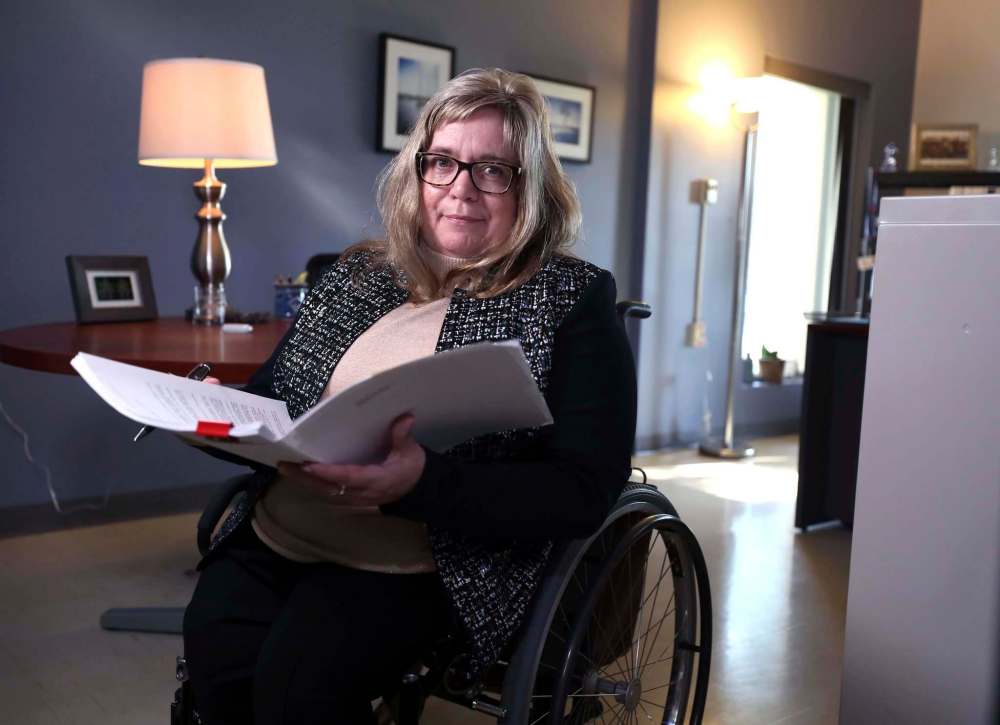Pre-trip interrogations irk Transit Plus riders
Questions to determine priority sometimes go too far, advocates say
Advertisement
Read this article for free:
or
Already have an account? Log in here »
To continue reading, please subscribe:
Monthly Digital Subscription
$0 for the first 4 weeks*
- Enjoy unlimited reading on winnipegfreepress.com
- Read the E-Edition, our digital replica newspaper
- Access News Break, our award-winning app
- Play interactive puzzles
*No charge for 4 weeks then price increases to the regular rate of $19.00 plus GST every four weeks. Offer available to new and qualified returning subscribers only. Cancel any time.
Monthly Digital Subscription
$4.75/week*
- Enjoy unlimited reading on winnipegfreepress.com
- Read the E-Edition, our digital replica newspaper
- Access News Break, our award-winning app
- Play interactive puzzles
*Billed as $19 plus GST every four weeks. Cancel any time.
To continue reading, please subscribe:
Add Free Press access to your Brandon Sun subscription for only an additional
$1 for the first 4 weeks*
*Your next subscription payment will increase by $1.00 and you will be charged $16.99 plus GST for four weeks. After four weeks, your payment will increase to $23.99 plus GST every four weeks.
Read unlimited articles for free today:
or
Already have an account? Log in here »
Hey there, time traveller!
This article was published 17/09/2019 (2275 days ago), so information in it may no longer be current.
Persistent and invasive questioning is all too common for people with disabilities requesting a pickup from the accessible public transit service, Winnipeg Transit Plus users say.
Debbie Van Ettinger said she was recently met with what felt like an interrogation when she put in a request for a pickup to go to a medi spa.
“‘What are you doing there?’… ‘What does a person do at a spa?’ And the questions just continued,” said Van Ettinger, an advocate for accessible transit and executive director at Ten Ten Sinclair Housing Inc. “I just refused to answer them.”

The City of Winnipeg requires users of the service formerly known as Handi-Transit to identify the purpose of a trip in order to determine its priority.
Work, school, medical appointments, therapy and rides to transportation terminals such as the airport are considered top priority. The second tier includes grocery shopping, support groups, religious services and volunteering. Recreational activities, grooming and other errands and outings are ranked last.
A city spokesperson said in a statement that when users call the contact centre, they are asked about the purpose of their trip.
However, Van Ettinger said there are often layers to the question, some of which get “quite personal.”
“I personally think some of this has to do with inappropriate training,” she said.
An accessible transit user for 12 years, Lorna Ross said she doesn’t feel it’s necessary to ask “uncomfortable” questions fixed-route bus riders are not subject to. Transit Plus user and advocate Karen Koch-Schulte shares that feeling.
“I don’t know how (Transit Plus) can decide what’s important and what’s not important. That needs to change,” Koch-Schulte said. “Wherever we’re going is obviously important to us.”
A priority system has been in place since the first accessible transit pilot was created in 1977. It has undergone many reviews with input from users and organizations that advocate on behalf of Manitobans with disabilities.
It has also been one of many aspects of Transit Plus service criticized by users and advocates.
Earlier this year, the provincial ombudsman released a 152-page report with 19 recommendations on accessible transit in Winnipeg.
The ombudsman recommended a review of everything from service eligibility and scheduling to its complaint and priority systems.
“We’re doing the best we can with the resources that are available. We’re making sure we’re getting the best bang for our buck and that we’re also, in terms of the ombudsman recommendations, implementing all of them,” said Coun. Matt Allard, chairman of the public works committee.
Allard said the next step is a report that will address a request for additional Transit Plus funding to meet all recommendations (the city contracts private transportation companies to provide service).
There are many kinks in the Transit Plus system, Van Ettinger said, but for the first time, she is optimistic these recommendations are drawing attention to the problematic service users have experienced for years.
So far this year, the service has been unable to provide 3,472 requested trips, due to limited resources available. Those unmet requests account for about one per cent of the total Transit Plus requests (285,078) the city has received in 2019.
With four months remaining in the calendar year, Transit Plus vehicles have carried 312,502 passengers, including both users and their guests.
maggie.macintosh@freepress.mb.ca
Twitter: @macintoshmaggie

Maggie Macintosh reports on education for the Winnipeg Free Press. Funding for the Free Press education reporter comes from the Government of Canada through the Local Journalism Initiative.
Our newsroom depends on a growing audience of readers to power our journalism. If you are not a paid reader, please consider becoming a subscriber.
Our newsroom depends on its audience of readers to power our journalism. Thank you for your support.


